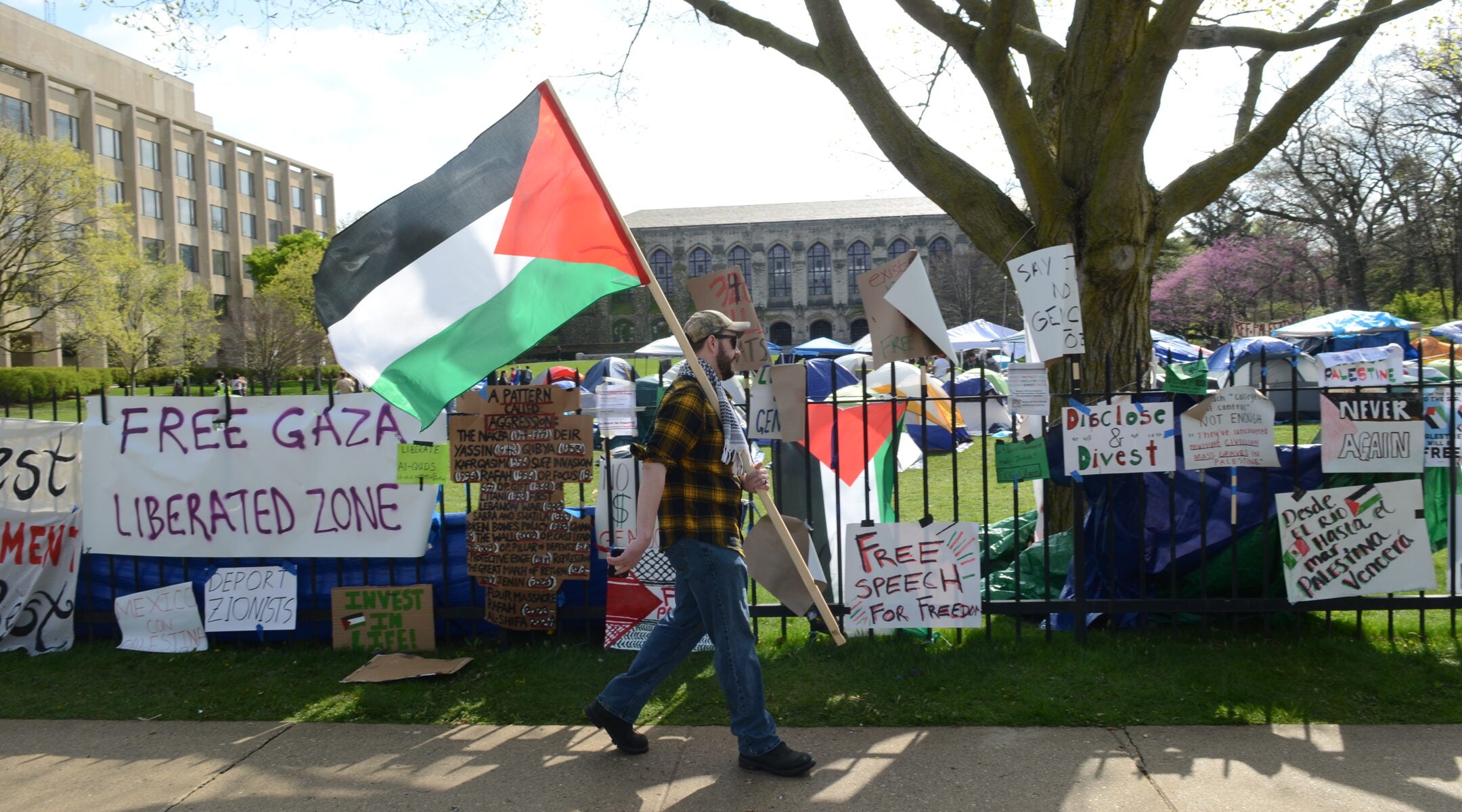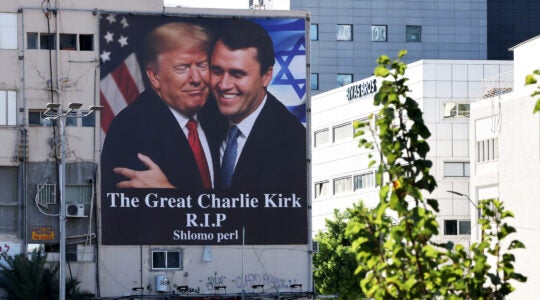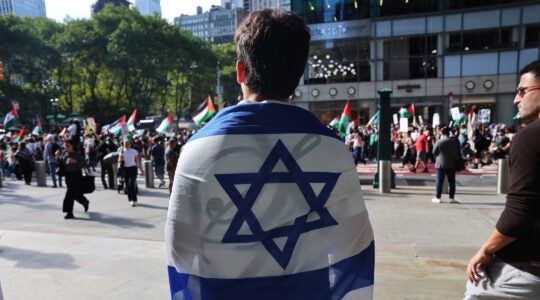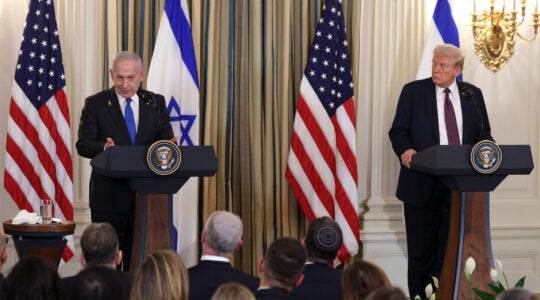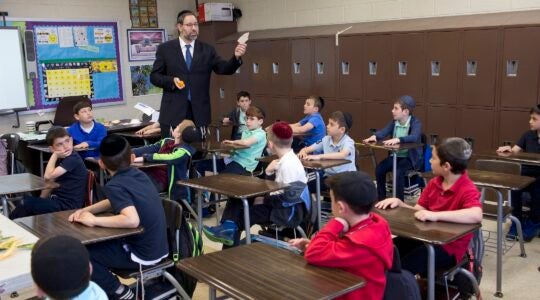After the Guardian reported on Sunday that hundreds of Northwestern University students were being blocked from classes after they refused to watch an antisemitism training video, the school offered a clarification on Monday: The real number of students penalized is less than three dozen.
But other elements of the story remain unchanged: The students are boycotting the video over what they allege is “biased” content in the video that the university began requiring this year in response to antisemitism allegations tied to pro-Palestinian protests on campus.
In a letter to Northwestern administrators last month, over 200 students, faculty and others not affiliated with the university criticized the “Antisemitism Here/Now” training video for being “denialist, unscholarly, discriminatory and morally harmful.”
The 17-minute video was created by the Jewish United Fund of Chicago, Chicago’s Jewish federation, at Northwestern’s request last year. The Guardian story quoted the module’s critics as saying it is biased in favor of Israel and said it does little to protect Jews.
The video, which the Jewish Telegraphic Agency reviewed, offers a basic history of Judaism, Israel and antisemitism. It says that some criticism of Israel can veer into or sound like antisemitism but emphasizes multiple times that not all critiques of Israel are antisemitic.
It does say that anti-Zionism is usually antisemitic.
“Anti-Zionism is the opposition to the Jewish right of self determination. Anti-Zionism also takes many forms, most of which are antisemitic, because they work against Jewish human rights,” an unnamed rabbi narrator says. “Anti-Zionism is not the same as Israel criticism. Democracies thrive under critique. Israel criticism is fine if/as long as it’s not based on conspiracy theories about Jews, distortions of history or antisemitic tropes.”
The video opens with a disclaimer from the rabbi, who appears to be Jonathan Posner of Metro Chicago Hillel, which JUF supports, noting that some Jews “may disagree” with the information offered.
“There are Jewish people who may disagree with some of the things that will be presented, and that’s okay. Jewish culture values disagreement and debate. This training is representative of the majority of Jewish people,” the narrator said.
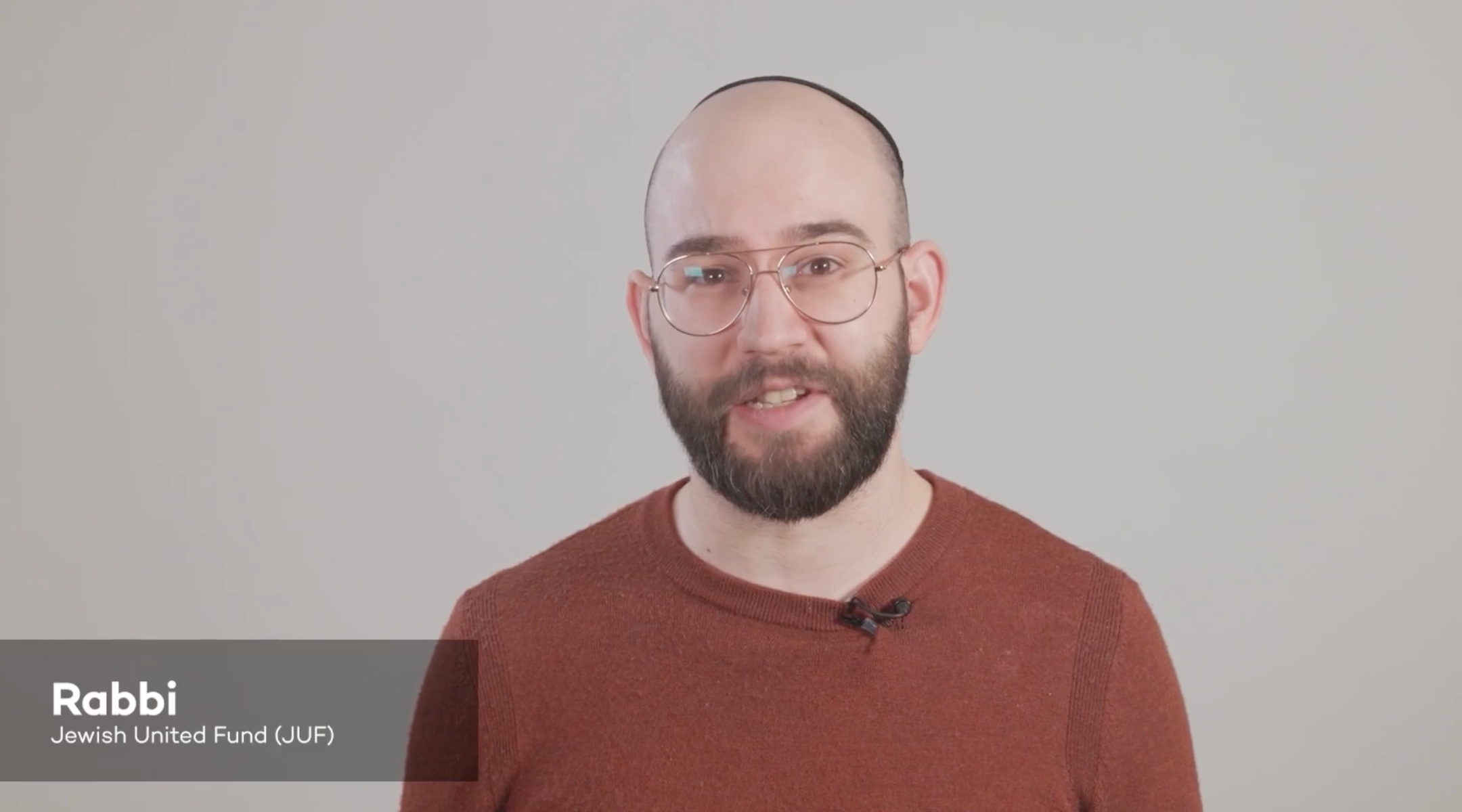
A rabbi narrates JUF’s “Antisemitism Here/Now” training video. (Screenshot)
In a statement, the university said that students were “not required to agree with the training modules” but did have to attest they would abide by the Student Code of Conduct. (The boycotting students’ letter also criticized the code of conduct for imposing limitations on student protest.)
The training video was endorsed by Michael Simon, the executive director of Northwestern Hillel, who said in an email that it was “crucial” to raise awareness about antisemitism and that the training served as a “jumping off point” for further learning at the school.
For Claire Conner, a junior at Northwestern and the student president of Hillel, her fellow students’ boycott of the antisemitism training video came as a shock.
“I was really surprised when I first heard of the boycott about the training because I had just watched the training, and I was actually surprised by the level of pluralism and nuance in the video, which made it even more confusing that people were protesting it,” said Conner.
Conner noted that students were not required to agree with the training, and said it was “disappointing” that some had refused to participate.
“Nobody is required to agree with the contents of the training. The only thing that’s required is that they listen,” Conner said. “So it’s disappointing to see that so many students have refused to even listen to an understanding of Jewish history, of our culture and of harmful prejudice that the vast majority of Jews identify with.”
The mandatory training was announced by the school in March in an email to the student body that cited President Donald Trump’s Jan. 29 executive order, “Additional Measures to Combat Anti-Semitism.”
Last year, as pro-Palestinian protests continued to roil campuses across the country, Northwestern became one of the first schools to enter direct negotiations with protesters, prompting the school’s antisemitism committee to resign en masse over criticism of the deal.
In April, the school faced a nearly $800 million freeze in federal funding by the Trump administration over allegations that it had failed to mitigate antisemitism on its campus. Ahead of the fall semester, after over a year of criticism over his handling of pro-Palestinian protesters and antisemitism on campus, the school’s Jewish president Michael Schill resigned.
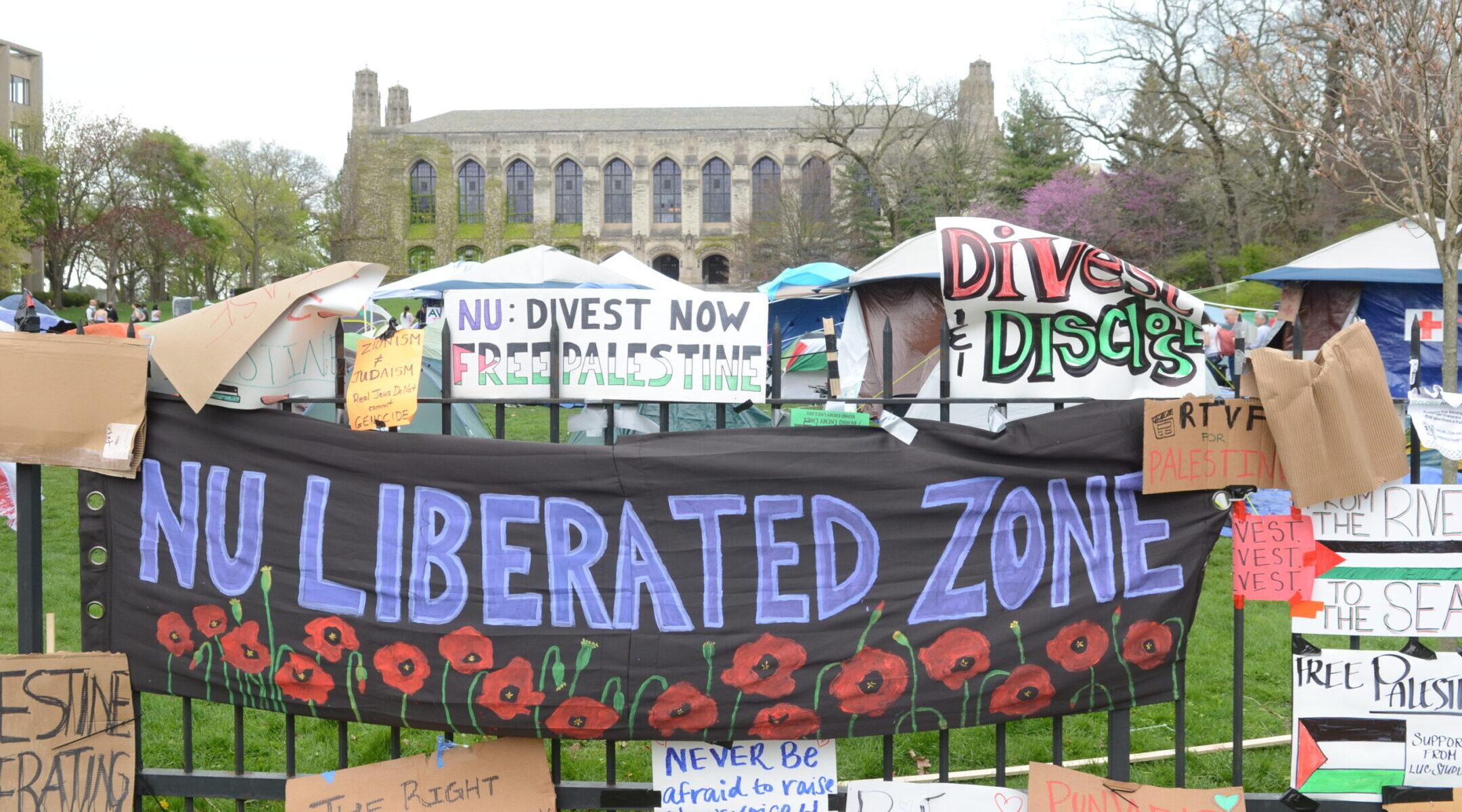
Students and residents camp outside Northwestern University during a pro-Palestinian protest, expressing solidarity with Palestinians with banners in Evanston, Illinois, United States on April 27, 2024. (Jacek Boczarski/Anadolu via Getty Images)
While Conner said that the campus climate had reached its tensest point following Oct. 7 and the campus protests, she felt that Northwestern had since “made big steps in the right direction” and the overall feel of the campus now was “relatively calm.”
According to JUF, the video was created in compliance with the International Holocaust Remembrance Alliance’s definition of antisemitism, a widely adopted definition that has been criticized for characterizing some anti-Israel speech as examples of antisemitism.
The boycott letter homed in on that issue as it outlined a litany of objections.
“Although it claims that criticism of Israeli state policies is allowed, the video extends the definition of anti-semitism to instances where imagery and language is directed at the violence perpetrated by the State of Israel,” the letter said about the video. “Thus, while political criticism is said to be permitted in theory, this appears not at all to be the case in practice.”
The letter also condemned the video for preventing Palestinian students from “advocating for Palestinian self-determination, since the video prohibits any critique of a state structure which privileges Jews over non-Jews.”
It continued, “We are also concerned that the cynical use of an anti-discrimination training to prohibit any dissent against the actions of a right-wing government will degrade the credibility and integrity of the very anti-discrimination protections the training claims to be promoting.”
The Guardian story also cites a student organizer, Micol Bez, as saying that JUF opposed a ceasefire between Israel and Hamas.
That claim may have referred to a January 2024 ceasefire resolution passed by the Chicago City Council that JUF opposed for being “one-sided,” according to Dan Goldwin, the federation’s chief public affairs officer.
“What we believe is we’d love to see a cessation of violence as quickly as possible, with the return of our hostages and moving on to something better,” said Goldwin. “But no, we’re not opposed to a cease fire, we’re opposed to a very specific cease fire resolution pending in front of the Chicago City Council.”
The letter also criticized the training video for incorporating a visual map of Israel that includes the Golan Heights and the West Bank, and for using the term “Judea and Samaria,” the biblical name for the West Bank favored by Israel’s government and its right-wing supporters.
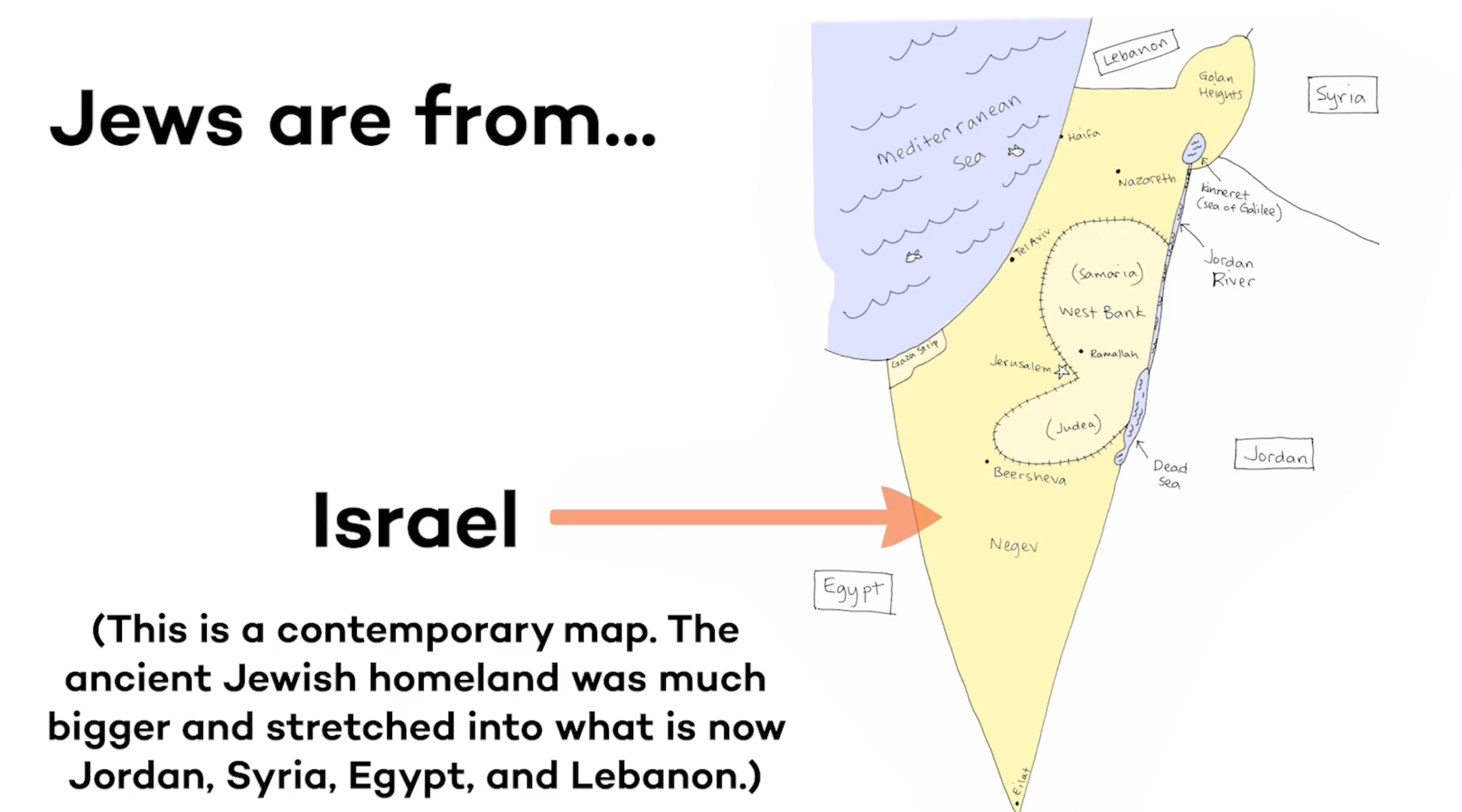
A hand-drawn map of Israel included in the “Antisemitism Here/Now” training video from JUF. (Screenshot)
Goldwin said the group had purposefully used a “hand-drawn, cartoonish-style” map of Israel to avoid “trying to prejudge what actual borders would or should look like.” The word Judea, he said, was meant to underscore a point in the video, not endorse the Israeli government’s language.
“The context where it is in the video is to basically give people a general orientation as to where Israel is, where our ancient homeland is, where the Jews came from, the word Judea and what it means. That’s where the word Jew comes from,” Goldwin said. “It was not meant to be an exact political delineation.”
In response to the training, the Northwestern chapter of Jewish Voice for Peace, an anti-Zionist student group, devised an alternative antisemitism training scheduled for Tuesday in a university building. The student group did not respond to requests for comment from the Jewish Telegraphic Agency.
“As antisemitism both rises internationally and at the same time is weaponized to repress Palestinian activism, it is more important than ever to understand what antisemitism actually is and how we actually fight it,” an Instagram post about the training read. “Join us on Tuesday for an actual antisemitism training by a Chicago community member.”
While Goldwin said the video had not been deployed at other universities, he said its content was the same as antisemitism training JUF had offered at other high schools and universities for “decades.”
Goldwin said that despite criticism of the training, he hoped that it would serve as an “important summary and explanation of the lived experience of thousands and thousands of Jews.”
“The important thing to keep in mind is that this video is an educational tool, and we’re not always going to agree with every piece of education we’re given,” he said. “This video doesn’t require you at the end to certify you agree with everything in it, but we hope it sensitizes you to understand where some of your fellow Jewish students are and what is impacting their ability to have a fruitful and beneficial college experience.”
Conner said she hoped that students would “reevaluate” their decision to boycott the video given the increase in antisemitic incidents nationwide.
“I think the fact that so many students are unwilling to even listen to a training on Jewish history and culture and on the history and causes of antisemitism is highly concerning in this time of rising antisemitism across the country,” she said. “I would hope that more people reevaluate their decision and recognize that it’s important to at least listen to this perspective and to engage with it respectfully.”
JTA has documented Jewish history in real-time for over a century. Keep our journalism strong by joining us in supporting independent, award-winning reporting.
